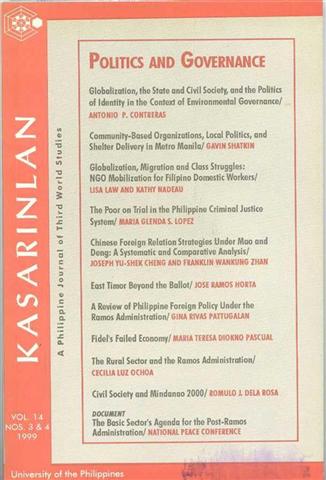Globalization, the Political Theory of the State and Civil Society, and the Politics of Identity in the Context of Environmental Governance
Abstract
The onslaught of globalization, like a bad storm, has caused serious implications not only to the practices of governance, but also on the body of theories that seek to explain the process of governance. The establishment of the discourse of the “global village” has eroded the power and autonomy of nation-states even as economies are increasingly becoming globalized. However, it is also evident that the power of civil societies within the boundaries of nation-states, and in the transnational arena has strengthened considerably. Also present is the awakening of cultural activism and women-based movements as a way of asserting the articulation of identities along ethnic or racial and gender lines. This interplay between globalization and governance requires an inquiry into the specific moments in which the political theories of the state and civil societies are either engaged or demolished; the manner by which politics of identity find their way to intervene and colonize the spaces which are left open by the unraveling of the colonial and patriarchal binds of the modern nation-state; and the manner by which globalization reasserts its agenda and recolonizes the spaces that are opened by identity-based politics. The final task is to locate these in the nexus of environmental resources governance.
Published
2009-07-28
How to Cite
CONTRERAS, Antonio.
Globalization, the Political Theory of the State and Civil Society, and the Politics of Identity in the Context of Environmental Governance.
Kasarinlan: Philippine Journal of Third World Studies, [S.l.], v. 14, n. 3, july 2009.
ISSN 2012-080X.
Available at: <https://journals.upd.edu.ph/index.php/kasarinlan/article/view/1412>. Date accessed: 30 aug. 2025.
Section
From the Third World Studies Desk
By submitting a manuscript, the authors agree that the exclusive rights to reproduce and distribute the article have been given to the Third World Studies Center.



